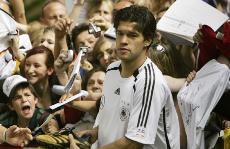German soccer captain is symbol of united country

German soccer fans cheer as Michael Ballack finishes signing autographs in front of the Hotel Grunewald in Berlin on June 28. Ballack has become a symbol of united Germany. The Associated Press
Jul 5, 2006
BERLIN – Three weeks of sparkling soccer has done what six decades of soul-searching could not: It’s made Germans proud to be German again, and prouder still of national team captain Michael Ballack, the communist sports prodigy who left the East to become a capitalist star in the West.
Trace the arc of Ballack’s career and it reads like a founding legend that modern Germany would write for itself.
Born in 1976 in the eastern half of a still-divided nation, his parents sent their 7-year-old son to play for the local club in Chemnitz, a city known as Karl-Marx-Stadt at the time. Even then, the deftness of Ballack’s touch and his skill with both feet marked him as something special.
By his third season, Ballack was delivering goals for the town’s youth team with the precocity of a young Wayne Gretzky – 57 in only 16 games – and so began his climb up the ladder of the state-controlled sports system.
It might have plateaued right there, leaving Ballack, like hundreds of topflight East German athletes, with little more to show for it than a decent apartment and a car. But then the wall came down in 1989, and suddenly he was staring at a wide world of possibilities.
Get The Daily Illini in your inbox!
In the years that followed, Ballack rounded out his game and became a fixture at bigger and wealthier German club teams in the Bundesliga and, finally, the field general for fabled Bayern Munich.
Now, two months shy of his 30th birthday and acclaimed as one of the finest midfielders in the game, Ballack is about to leave Germany for England’s Premier League. But first he is being asked to recreate the success of that personal journey while carrying the hopes of a nation on his broad shoulders.
“His role is hugely important for us,” coach Juergen Klinsmann said on the eve of Germany’s semifinal Tuesday against Italy. “He leads the way.”
When Klinsmann agreed to take over the team, he came under criticism for a few things: living most of the year in sunny, laid-back California and scrapping Germany’s traditionally dull, overwhelmingly defensive 3-5-2 formation in favor of an aggressive, wide-open 4-4-2 scheme.
Most of all, though, critics jumped on Klinsmann for raising a gloomy nation’s expectations. He declared a German team most felt was still four years away ready to win the World Cup now. After three weeks of games and one nervy win after another, with Ballack pulling most of the strings, the coach looks like a genius. Those victories have loosened up his countrymen in a way the organizers, politicians and even the shrewdest observers of German society didn’t see coming.
But it’s come with some personal cost, too. Ballack will be transferring to Chelsea for the upcoming season, and while the negotiations were going on, he was ripped for being selfish and lazy, two of the worst traits to a German.
And his rise to stardom, along with the implications it carries for the still-struggling East, has been analyzed so often and layered with so much meaning that he won’t talk about it anymore. But something he said recently could be the template for a nation trying to decide how to put its best foot forward.
“If I had wanted to be a local hero,” Ballack said, “I would have had to stay in Chemnitz.”





